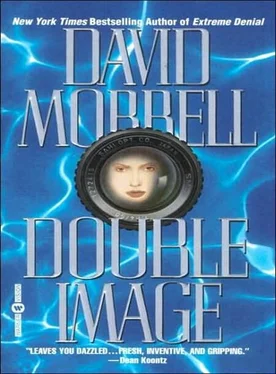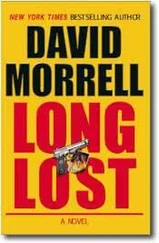The door hissed open, the attendant stepping out. “I can’t tell her mood, but she’s ready to see you.”
Am I ready, though? Coltrane asked himself.
After an uncertain glance toward Jennifer, he felt encouraged by the touch of her hand on his arm. He entered the room.
The rest home’s administrator had given Coltrane a sense of what to expect. Even so, he was caught by surprise, faltering as Jennifer closed the door.
“There’s been a mistake. We’re in the wrong room.”
“No mistake,” Jennifer said.
“But…” Coltrane stared at the apparently sleeping woman on the bed. “Tash’s mother was born in 1934. Depending on when her birthday is, she’d be sixty-three or sixty-four now. But this woman is-”
“What are you whispering about?” the woman on the bed complained. She sounded as if she had broken glass caught in her throat.
“Sorry,” Coltrane said. “We thought you were asleep. We were trying to decide whether to wake you.”
“You mean you were trying to decide if I was asleep so you could feel me up.”
“Uh…” Coltrane lost the power of speech. The woman in the bed, who should have looked in her early sixties, seemed in her nineties: stringy, thinning white hair, rheumy red eyes, shriveled skin, a prematurely shrinking and collapsing body. A scar disfigured each of her cheeks. But the most disturbing aspect about her was that, in spite of all the ravages her body had endured – “From alcohol and drugs,” the administrator had explained – she was recognizably Rebecca Chance’s daughter and Tash’s mother, as if this was how Rebecca Chance would have looked had she lived and led a hard life, or as if this was how Tash was destined to end.
“Go ahead. Feel me up. The attendants do it all the time.” The prematurely old woman pawed at her spiderweb hair, as if combing it.
Coltrane looked at Jennifer, shocked and sickened.
“Stephanie?” Jennifer approached the bed.
“Who the hell are you ?”
“My name’s Jennifer. We’d like to ask you a few questions.”
“No women allowed.”
“We brought you some photographs of your daughter.”
“No women allowed.”
“If I leave, do you promise to talk to my friend?”
“Did he come here to…”
The suggestion she made turned Coltrane’s stomach sour.
“I’m afraid the attendants wouldn’t like him to do that,” Jennifer said. “They might get angry.”
“Good.”
“They might start a fight.”
“Yes.”
“You enjoy that?”
“Make them fight. They deserve to be punished.”
“Why?”
“For wanting me.”
“Does your daughter like men to fight?”
“The little…” The next word was shocking.
“Why do you call her that?”
“Thought she was better than me. Took my men away from me.”
“When she was in college?”
“Hah.”
“In high school?”
“Hah. When I was asleep, she got a razor, snuck up, and did this to my cheeks. Couldn’t stand her momma to get all the attention. Thought she could destroy the competition. Didn’t work. I’m still as beautiful as ever.” She gave Coltrane the most demanding look he had ever received. “Aren’t I?”
“Yes.”
“Then…”
What she said next made Coltrane look away.
“What good are you? Get yourself a new boyfriend, missy. This one can’t cut it. Pictures? Did you say you brought pictures of my daughter?”
“Yes,” Coltrane managed to say.
“Burn them. Send her to hell. And get out of here. Quit wasting my time. I’ve got men lined up waiting to-”
“You’re right,” Coltrane said. “We’re wasting your time. I’m sorry we bothered you.”
ON THE PILLARED STEPS OF THE REST HOME, Coltrane sank and put his head between his knees. It took him several deep breaths before his swirling sensation passed and his stomach became still. From the bay, a salt-laden breeze drifted over him, cooling the sweat on his brow.
Finally he was able to peer up at Jennifer. “You’re the one who took all the psychology courses.”
“It’s called being a sexual predator,” Jennifer said. “In women, it’s very rare.”
“But how did…”
“Heredity or environment. Take your pick.”
“Or both. In other words, who knows,” Coltrane said.
“My abnormal-psych prof said that emotional illness can be inherited.” Jennifer eased down next to him, crossing her arms over the knees of her gray slacks. “We don’t know anything about Rebecca’s mother, but she and her daughter and her granddaughter are all beautiful women so obsessed with their beauty, so self-conscious and uncomfortable about it, that they feel self-worth only when men fight over them.”
“Or they were all abused as children and they’re so ambivalent about men, so bitter, that they want to punish men for finding them attractive,” Coltrane said.
“Which takes us from heredity to environment. We don’t know how that pathetic woman in there was raised. It could be Winston Case was a monster. But from what she said about the way Tash or Melinda or whatever you want to call her was raised, it’s clear that even as a child, Tash felt jealous about all the men her mother had around her. She needed attention, but since she couldn’t get it from her mother, she got it from her mother’s boyfriends. The trouble is, she may have gotten more attention than she bargained for. If Tash was molested, I’m not surprised that she feels so angry at men now that she’s grown up. On the one hand, she feels compelled to tempt them. On the other hand, she needs to punish them for wanting her. Having sex with her is unforgivable.”
Coltrane felt his cheeks turn warm.
“I have a terrible feeling you’re next on her list of get-evens,” Jennifer said. “But even if you hadn’t had sex with her, you know she was lying about the negatives and Duncan Reynolds. You see through her act, and that puts you in a position to make trouble for her. If she’s true to form, she’ll protect herself by finding a way to get rid of you.”
“Just as she got rid of Duncan and her former boyfriends. That’s what she’s doing with Walt. She’s setting him up to use him against me.”
“We have to warn him.”
“MR. COLTRANE, this is Eliot Blaine,” a concerned voice said from the speaker on Coltrane’s car phone. As soon as he and Jennifer had gotten back to the Los Angeles airport, he had called his home to find out if he had any messages on his answering machine. A series of hang-up calls had troubled him, reminding him of Ilkovic, making him wonder if it was Walt. Then Blaine said, “I’m the attorney for Randolph Packard’s estate. I don’t know if you’ve heard this from another source. If not, forgive me for being the messenger of bad news. I know you spent time with Randolph’s assistant, Duncan Reynolds. He confided to me that he was fond of his chats with you. I’m… There’s no easy way to say this. You’ll be as dismayed as I was to learn that Duncan’s body was found at his home last evening. Apparently, he’d been dead for several days. The police seem to think he committed… It’s more appropriate if we discuss this in person. Please call me at my office. About a week ago, Duncan came to me with a strange request. I respected his privacy and didn’t question him about it, but it now seems obvious that he was taking care of personal matters before… I have a package he wanted me to give you in the event of his death.”
“AN AUDIOCASSETTE?” Coltrane looked puzzled at the object he removed from the envelope.
Seated in a soft-looking brown leather chair behind a large glass desk, Blaine slid a signed letter in Coltrane’s direction, his manicured fingernails glistening. “At the time, I thought it was a strange request, but in my profession, strange requests aren’t unusual. Duncan’s instructions to me were that you should listen to the tape in my presence. When you telephoned to say you were coming, I instructed my secretary to rearrange my schedule so that we could do so now.”
Читать дальше












